Joselin Mendoza sleeps on the floor of a cold stone basement with her two kids at a house in Roseland. The two-story house has no furniture and 22 other migrants from Venezuela sleep on mattresses or blankets on the floor. Their clothes and stuffed animals are stacked in neat piles nearby.
The property’s owner Chris Amatore came by in a truck one day in January and offered her the chance to leave a city-run shelter before she and her family were kicked out.
“What were we supposed to do?” asked Mendoza, who said she hadn’t received any government or charitable assistance. “How are they going to put so many people on the street?”
There are close to 14,000 migrants in 28 shelters around the city, and Chicago is on track to tap out the $150 million dedicated to migrant response in April.
The city plans to kick out migrants who have been staying at city-run shelters for longer than 60 days starting in March, saying the shelter system was designed as a “temporary” solution for people to live. City officials say their ultimate goal is to help resettle migrants into homes where they can be self-sufficient. But federal funding for resettlement has run out, and migrants who arrived after Nov. 17 have no assistance or options.
Migrants facing looming eviction notices say they are happy to stay in any building they can find. Driving by several city shelters, Amatore saw their desperation firsthand. Unsatisfied with the city’s response, he opened numerous buildings he owns to help house them.
He has now resettled close to 500 migrants in 15 buildings around the city, spending $150,000 of his own money, he said.
Amatore’s solution isn’t a long-term fix — for himself or the migrants, who are grateful for the vacant buildings they now call home. He is facing strong backlash from community members and city officials, as housing experts raise alarms about what is going to happen to thousands of people without assistance.
Shelter limits
Mendoza said she had to sign a form when she entered the shelter on the Lower West Side, agreeing to move out after 60 days.
With city and state funds drying up and more migrants arriving each week, Mayor Brandon Johnson has put limits on how long people can stay in shelters. He’s extended these limits twice now, facing criticism from migrant advocates about putting people out on the street in freezing temperatures.
According to city officials last Monday, migrants who originally had an exit date between Jan. 16 and Feb. 29 will be given a 60-day extension starting from their original exit date. Over 5,000 people fall into that category.
Before limits were extended, Mendoza said she and other migrants were panicking as her eviction date grew closer. Then Amatore drove by.
“At first we were a little scared, but then we realized he was trying to help us,” she said.
“He’s an angel who fell from the sky,” added 28-year-old Maria Malpica from Maracay, Venezuela, who is one of dozens of migrants staying at the house in Roseland.
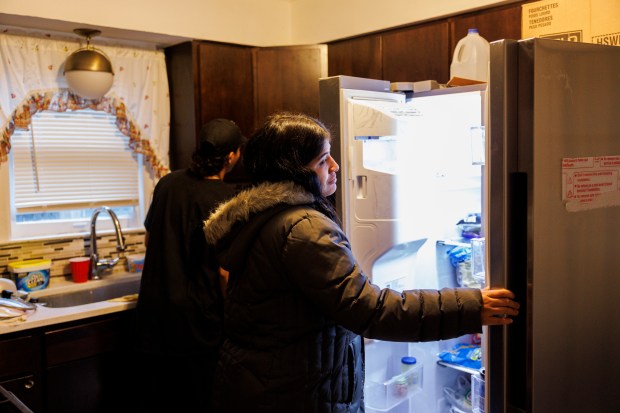
When asked why the city is moving people out after 60 days, the city’s Office of Emergency Management and Communications spokesperson Mary May said the city’s shelter system is a “temporary” solution to help migrants “on the path to resettlement.”
“By concentrating our resources into a shorter time frame, we can help new arrivals achieve outmigration and resettlement more efficiently, and the City will continue to assess the size and sustainability of the shelter system given the financial resources available,” May said.
May denied that the city was “kicking out” migrants and clarified that their 60-day policy gives migrants the ability to request an extension due to extreme weather, medical conditions and lease start dates, among other reasons.
If migrants don’t receive an extension, they can re-enter the housing system by going back to the landing zone — where migrants have in the past had to scrounge for food and sleep on buses for days without showering.
Amatore’s buildings
Amatore, president and founder of Manage Chicago, a property management company in West Pullman, said he was compelled to help house migrants after he read about their squalid living conditions at the city’s landing zone ahead of one of the worst cold snaps in Chicago in recent memory.
He admitted his process was somewhat unorganized. In mid-January, he picked up a group of single men at the city’s “landing zone” in the West Loop and brought them to a building at 7831 S. Colfax Ave. in South Shore.
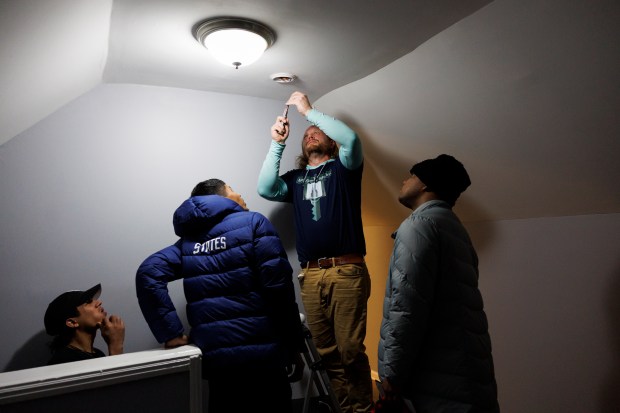
He then picked up migrants who had been staying at Harold Washington Library and migrant families staying at the shelter on the Lower West Side, which has been the site of controversy after 5-year-old Jean Carlos Martinez Rivero died there in December from unknown causes. He brought them to several other buildings on the South Side.
He said asylum seekers at the Lower West Side shelter frantically got in the back of his truck. They were clearly looking for a way to get out, he said.
Amatore’s buildings have heating, electricity and showers. He is not charging the migrants rent, and has even ordered them Instacart grocery delivery.
“I’ve never done anything like this in my life,” he said Monday, as he replaced a fire alarm in the house in Roseland.
‘God presented this opportunity for us to come here.’
The families at the house said they’d been worried about being kicked out of the shelter before Amatore picked them up.
Idalia Rodriguez, from the northwest Falcón state of Venezuela, said she spent a month in Texas sleeping on the street with her three kids — ages 6, 10 and 15. She decided to come to Chicago hearing there were legal services and assistance. Texas officials bought airplane tickets for her and her family, she said.
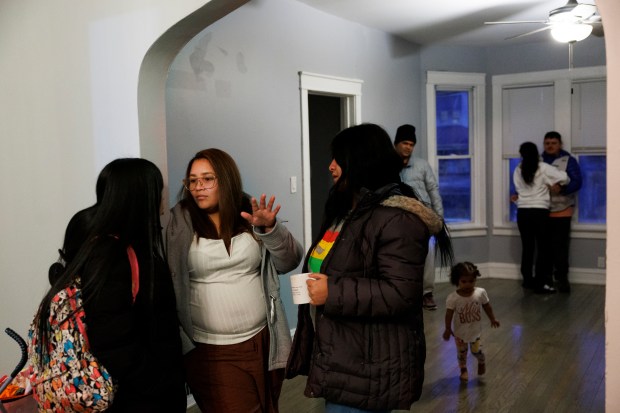
Rodriguez said migrants at the city shelter were crammed tightly together. Food was scarce.
“Thankfully, God presented this opportunity for us to come here. So we can move forward with our lives,” she said.
The seven families support and help each other. The children’s commute to Maria Saucedo Scholastic Academy in Little Village is now over an hour by bus and train, so the adults take turns.
When the kids get home from school, everyone gathers around to talk. Later in the night, moms will cook arepas rellenas de huevos revueltos, traditional Venezuelan corn cakes with scrambled egg fillings. Their children will kick around an inflatable ball in the large two rooms off their shared kitchen.
There is no furniture, so the kids have space to run around. Their happy shrieks fill the house.
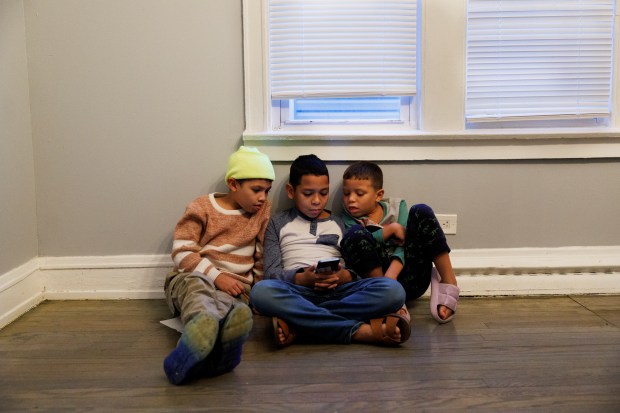
Chicago’s golden ticket: resettlement
The city has repeatedly pointed to resettlement as their golden ticket to responding to migrants who have come to the city over the past 17 months. But the resettlement process is slow, and many people now don’t qualify.
Due to a lack of federal funding, migrants who arrived after Nov. 17 are currently not eligible for the city’s resettlement process, according to Illinois Department of Human Services spokesperson Daisy Contreras. This means none of the families staying in Amatore’s house in Roseland qualify for rental assistance.
The city’s resettlement process is funded by the IDHS and managed by Catholic Charities Chicago through a program called the Asylum Seeker Emergency Assistance Program.
Through Jan. 31, 11,891 migrants had been resettled through the program, according to IDHS data. The state has provided over $38.7 million in rental assistance to support close to 5,000 households, mostly on the South and West Sides.
“Even in the easiest of circumstances, securing housing is never immediate, and navigating the more limited affordable housing stock in particular can be challenging,” Contreras said in a statement.
Migrants like Rodriguez and Mendoza who arrived after Nov. 17 can still apply for benefits, application support, acute needs, school enrollment assistance and connections to Illinois welcoming centers, Contreras said. But many migrants don’t know where to find this support.
“What’s the name of this neighborhood?” Rodriguez asked the group of migrants gathered in the kitchen Monday.
She said her husband lost his immigration documents on a train going downtown. They have no idea who to call.
Certain level of risk
Amatore doesn’t have a plan for how long he will continue to house the migrants. He said he does understand the certain level of risk he assumes by taking people in.
“If a fire did happen and someone got hurt, I would be in trouble,” he said.
Interested building or property owners can fill out a form online to find out if their building or property meets the criteria to house migrants. Almost 300 people have filled out the form, according to internal data received by the Chicago Tribune — including the owner of a large hotel in Springfield and a pastor offering abandoned convents and rectories.
Officials from Department of Family and Support Services and OEMC vet all options to ensure buildings have a 200-person capacity, no major repairs needed and access to showers or the ability to support a shower trailer.
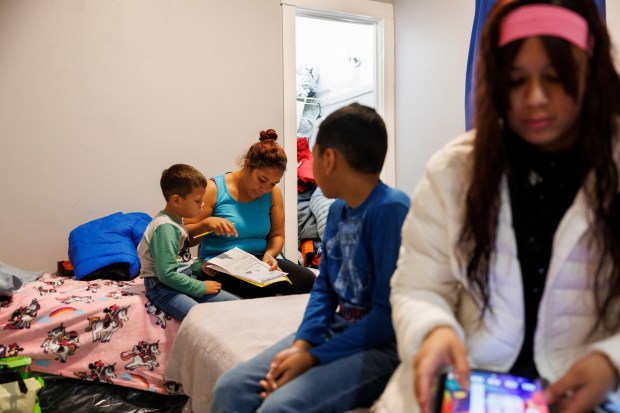
May from OEMC said Amatore’s proposed locations likely didn’t meet the criteria for temporary emergency shelters managed by the City of Chicago, but that migrants are free to leave the shelter system as they wish.
Amatore said migrants by the shelter on the Lower West Side have told him their children are living in terrible conditions. Many are falling ill with no medical help, he said.
He is urging the mayoral administration to adopt a faster, more comprehensive resettlement process. Until then, he believes God told him he was needed to step in.
“There is nothing for these migrants. They don’t know what to do. Where to go. Nobody’s there to help them,” he said.
Backlash
Amatore’s buildings on the South Side highlight an ongoing conflict about opening migrant shelters in wards still recovering from past disinvestment.
One building received backlash on social media by some who said they had been broken into.
“(The migrants) were just coming back from the grocery store or something,” said Amatore. “They’re all really good people.”
Amatore also clashed with Ald. Greg Mitchell, 7th in a heated meeting Monday in the alderman’s office over two buildings housing migrants in his ward. Afterward, Amatore filed a complaint with Inspector General Deborah Witzburg and emailed all 50 aldermen.
In the complaint, Amatore wrote Mitchell “threatened my life (assault and intimidation), threatened to terminate a Chicago Housing Authority (CHA) Contract my company, Manage Chicago, Inc, has” and “threatened that he would block a potential zoning change” with a deputy buildings commissioner.
Following a story aired by Channel 7 about Amatore’s decision to house migrants, the alderman asked if they could meet at his office at 2249 E 95th St.
Amatore said Mitchell began the meeting by pointing fingers at him, asking him why he had housed migrants. Amatore responded by saying he had asked to meet with the alderman earlier, and even filled out a form with his plan, but received no response.
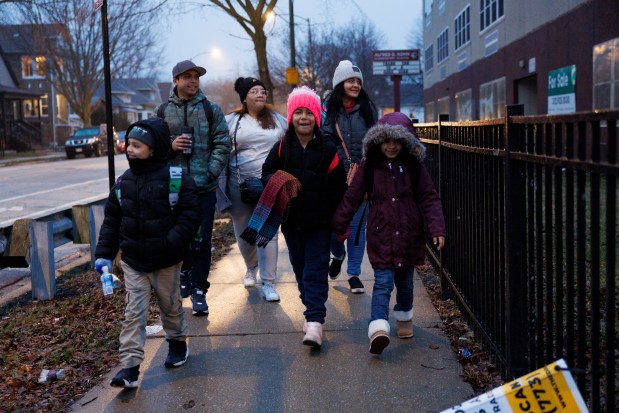
According to the complaint, Mitchell asked Amatore why he would help “migrants only” and not “help Black people in his ward.” Amatore responded: “We are all God’s souls and I do not distinguish between skin color when I decide to help someone.”
Enraged, Mitchell then allegedly said, “‘You better watch your f—ing ass walking around my Ward because you are no longer safe.’ Then (Mitchell) said ‘You have a f—-ing CHA contract, don’t you, consider that terminated after I make one phone call, you can kiss that s–t goodbye.’”
Amatore wrote in the complaint that he offered to move the migrants to a different location. He asked Mitchell to come visit one of the buildings to meet the migrants.
Mitchell did not respond to multiple calls for comment about the incident.
A homelessness crisis in Chicago
Beyond neighborhood tensions, moving people out of shelters poses serious challenges for a city that is already struggling to house thousands.
“The complexities of obtaining work permits, coupled with the observation that even with employment, individuals may still struggle to afford market rent, highlight the multifaceted nature of this crisis,” said Interim Associate Director of Policy for Chicago Coalition for the Homeless Sam Paler-Ponce.
Paler-Ponce said local, state, and federal governments have never chosen to adequately fund a response to the homelessness crisis.
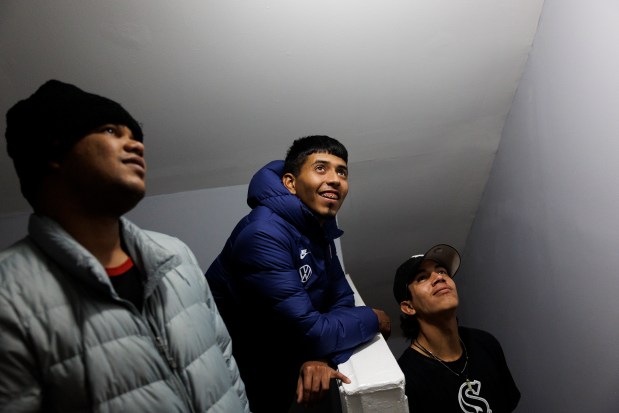
The city should preserve durable housing solutions for families with children, said Philip Garboden, a professor at the University of Chicago’s Crown Family School of Social Work, Policy and Practice with expertise in housing and public policy. In an interview ahead of the most recent eviction warning, he said he was mostly concerned about children being kicked out.
“Unplanned mobility for children has short and potentially long-term consequences for their academic performance and emotional well-being. These children will be moving in the middle of the school year,” he said.
Garboden said the close to 14,000 migrants in need of shelter space speak to how stretched thin the subsidized housing system is in Chicago.
“We basically have been running either at or even above capacity for a really long time,” he said. “So it’s not surprising when you have a sudden influx of need — as we have with the migrant situation — that our housing systems do really struggle to adapt to that problem.”
A semblance of privacy
Mendoza expressed thanks for being able to sleep in Amatore’s darkly lit basement.
Tuesday morning, Mendoza got her kids ready to go to school. They used a ledge to balance their few things — a plastic water bottle, a thermos, some receipts. They have hung up plastic tarp to divide the room so more migrants can sleep on blankets nearby with some semblance of privacy.
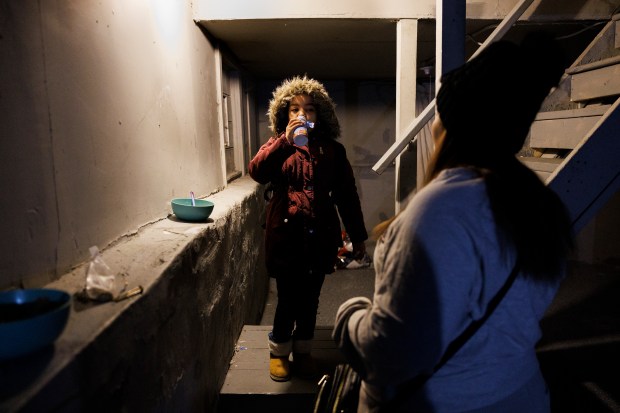
Mendoza’s 10-year-old son Jeremy has mild autism. She said this makes her extra grateful for the space.
“Mami, hand me my jacket,” Mendoza’s 8-year-old daughter Ireanyerlin said to her mother. She put on a see-through backpack and took a sip of chocolate milk out of a little plastic bottle.
Two families exited the house and walked several blocks together to wait for the bus to start their hour-long commute to school.



